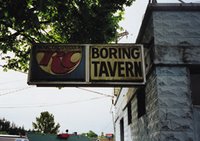"My objective: never to tell myself stories, which is the only 'definition' of materialism I have ever subscribed to" (169)I like this definition, for reasons I've hinted at before. The real follows no narrative; stories are always elaborated around, and an inevitable distortion of, the real.
"'Not to indulge in storytelling' still remains for me the one and only definition of materialism" (221)
["'Ne pas se raconter d'histoire,' cette formule reste pour moi la seule définition du matérialisme."]
 Meanwhile, Susan is getting excited about boredom. (Catchphrase: "boredom, not as boring as you think.") It's in part an elaboration of her suburbs project. (Catchphrase: "suburbs, not as boring as you think.") She's enjoying A Philosophy of Boredom. (The Times: "Lars Svendsen (boring name), a professor of philosophy (boring subject) from Norway (boring country), has written a quite fascinating book.")
Meanwhile, Susan is getting excited about boredom. (Catchphrase: "boredom, not as boring as you think.") It's in part an elaboration of her suburbs project. (Catchphrase: "suburbs, not as boring as you think.") She's enjoying A Philosophy of Boredom. (The Times: "Lars Svendsen (boring name), a professor of philosophy (boring subject) from Norway (boring country), has written a quite fascinating book.")And I've mentioned boredom before, both as a kind of degree zero of affect, and in terms of Agamben's discussion of Heidegger.
 But if we think of boredom as a result of narrative failure--the point at which stories fail to entertain--could it not be recast as the materialist affect par excellence?
But if we think of boredom as a result of narrative failure--the point at which stories fail to entertain--could it not be recast as the materialist affect par excellence?As Deleuze says, in what is one of my favourite lines of his (which I've also cited before): "Tiredness and waiting, even despair are the attitudes of the body."
"These are tough times for boredom", claims Michael Crowley. I'm not so sure. The fact that we endlessly seek distraction (Crowley mentions ubiquitous TV and the "wormhole" of the internet) signals less "boredom's demise" than how easily distracted we are, precisely because of our underlying disaffection.
We flip through the channels and click through the pages, listessly, mechanically. We have an ever smaller attention span for the stories we are told. Are we then close to a "materialist way"?
The images in this post are from Martin Parr's "Boring, Oregon" project. Parr is today's high priest of boredom, with Bored Couples and the Boring Postcards trilogy. See Jonathan Bell's review and also a fine collection of Swedish boring postcards.
No comments:
Post a Comment